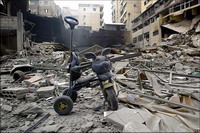European countries unite in attempt to protect journalists in war zones
The United States, Britain and France will take all necessary steps to gurantee the safety of journalists in war zones.

The three countries became the first signatories of the Geneva Conventions to accept a new nonbinding accord on protecting correspondents in conflict, said the International Committee of the Red Cross, which oversees compliance with the 1949 treaty on the rules of war.
"The United States is absolutely committed to protection of journalists in conflict zones," John Bellinger III, the State Department's legal adviser, said in a statement.
Media rights campaigners cautiously welcomed the pledge, but said it would be measured by what the countries did in practice.
Under the Red Cross-proposed agreement, countries are obliged to educate their soldiers and security forces in international humanitarian law. They also are supposed to preserve media independence and act against those who seriously violate the rights of journalists.
"Our primary concern is that these legal principles are not respected in practice," said Joel Simon, executive director of the Committee to Protect Journalists.
He said research by the New-York based group found that U.S. military forces have been responsible for the deaths of 16 journalists in Iraq. "While we have not found any of these incidents to be deliberate attacks on the press, none have been fully investigated," Simon said.
In April a Spanish judge indicted three U.S. soldiers over the 2003 death of a Spanish journalist who was killed when their tank opened fire on a hotel in Baghdad.
The United States has refused to extradite the soldiers to Spain to stand trial, saying a U.S. review of the incident found the use of force justified.
Officials at the U.S. State Department refused to comment Thursday on whether the pledge would affect Washington's handling of the case.
Other media rights campaigners noted that only three out of the 194 signatories to the Geneva Conventions have taken the opportunity to reaffirm their commitment to protect journalists, which is already guaranteed in various sections of the conventions.
"There seems to be an unfortunate reluctance among a great many countries that really could well make this pledge to do so," said George Gordon-Lennox of the Paris-based group Reporters Without Borders.
In the first six months of this year alone 100 journalists and other media workers died on the job, compared with 68 in the same period last year, according to the International News Safety Institute, a Brussels-based group.
It said that after Iraq, the places with the most journalists killed during the first half of the year were Afghanistan, Haiti, the Philippines, Somalia, India, the Palestinian territories, Sri Lanka, Mexico and Brazil.
Subscribe to Pravda.Ru Telegram channel, Facebook, RSS!


